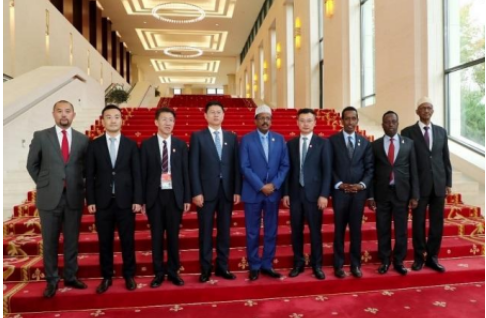Latest News
Behind the Scenes: Leaked Documents Expose Huawei’s Tactics in Somali Telecom Market

Mogadisho , Somalia : The telecom landscape in Somalia has undergone a significant shift with the rise of Huawei, a global telecommunications giant. However, concerns about market fairness, regulatory compliance, and national security have surfaced in response to Huawei’s dominant position in the country’s telecom sector. This article aims to explore the economic and security implications of Huawei’s controversial operations in Somalia, especially in light of the company redirecting its operations to Africa after encountering bans in the UK and the US.
Economic Implications
Huawei currently holds a staggering 80% share in the Somali telecom equipment market, raising eyebrows regarding potential unethical or illegal practices in its agreements with local operators. The concentration of power has sparked questions about market fairness, hindering healthy competition and limiting opportunities for new entrants. Large business contracts and loans have become tools of influence, potentially distorting competition and impeding innovation. This economic dominance may obstruct Somalia’s economic development and hinder technological progress.
Vendor Lock-In and Consumer Impact
Huawei’s strategy has resulted in vendor lock-in, restricting operators from switching to competitors and stifling healthy competition. This has led to higher consumer prices and limited choices for the Somali population, casting doubts on the sustainability of such market dynamics.
Technical Challenges and Security Risks: Huawei’s failure to comply with Somali telecom regulations and its supply of equipment not intended for ITU Region 1 have raised serious technical issues, including frequency interference. These challenges extend beyond Somalia, impacting neighboring countries and highlighting potential security risks and cross-border telecom disruptions.
Manipulative Tactics and Government Engagement: Leaked documents suggest Huawei’s use of manipulative tactics, selectively designating certain operators as agents while excluding others. Despite efforts by the Somali government to engage with Huawei and address these concerns,
success has proven elusive, revealing challenges in government oversight and regulation within the telecom sector.
Shift of Operations to Africa
Adding complexity to the situation is Huawei’s strategic shift of operations to Africa following bans in the UK and the US. This move introduces new dimensions to the economic and security concerns surrounding the company’s activities in Somalia.
Data Security and Lack of Oversight
A significant cause for concern is the alleged trade of subscribers’ personal data by Huawei, with accusations that the company sells this information to the highest bidder. The absence of a physical presence in Somalia limits the government’s ability to engage in direct oversight, emphasizing the potential risks associated with unchecked dominance.
Hidden Ownership and Fair Competition
Recently disclosed secret documents reveal Huawei’s hidden majority ownership (51%) in Hormuud Telecom, a major player in Somalia’s telecom market. This has raised concerns over transparency and fair competition, especially considering Huawei’s dual role of controlling Hormuud Telecom while supplying equipment to other companies in Somalia.
Finally, Huawei’s overwhelming presence in Somalia’s telecom sector, coupled with questionable business practices, regulatory non-compliance, and manipulative tactics, presents serious economic and security concerns. The situation calls for heightened scrutiny and decisive action from Somali authorities to ensure market fairness, regulatory compliance, and national security in the evolving telecom landscape, especially in light of Huawei’s shifted operations to Africa post-bans in the UK and the US.





















